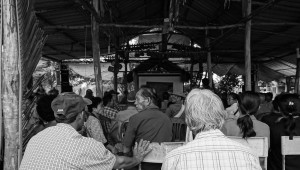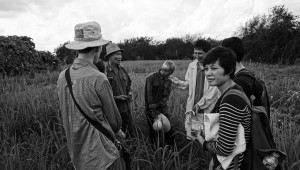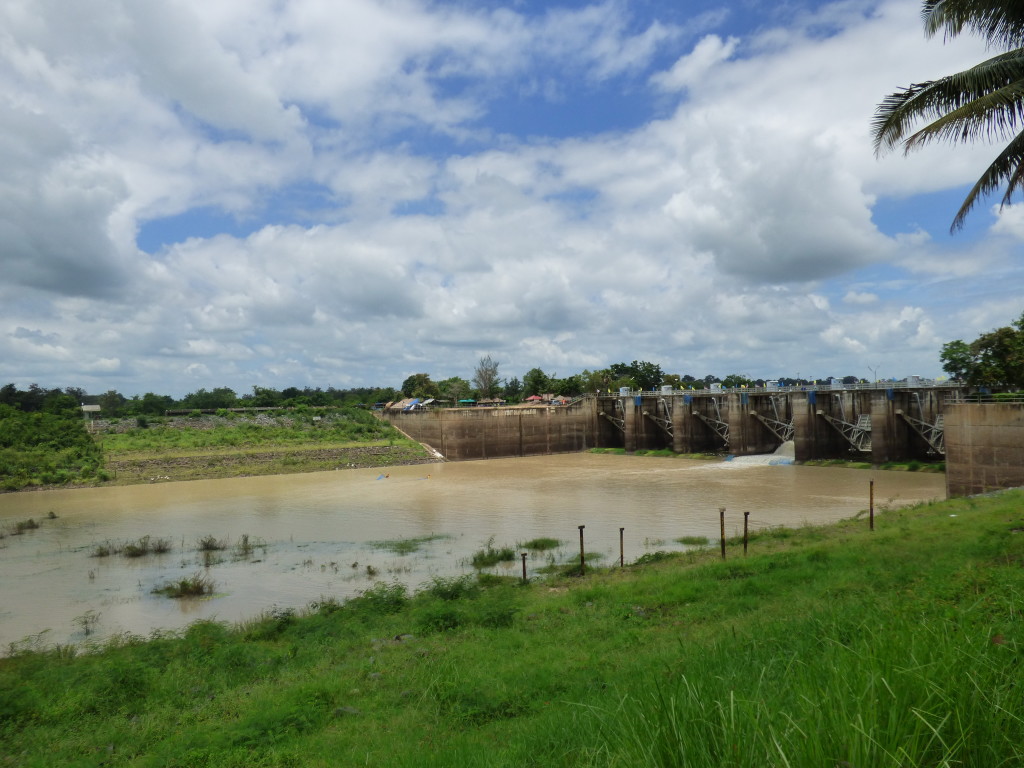EVENT REPORT: Political Ecology in Asia: Plural Knowledge and Contested Development in a More-Than-Human World [Bangkok, 10-11 October 2019]
/Keynote Speech 10 October 2019: “Reflection on Vijñana of Religion: New Animism in the Age of the Anthropocene” by Thanes Wongyannava, Retired Professor, Faculty of Political Science, Thammasat University.
On 10 and 11 October 2019, Center for Social Development Studies together with Chula Global Network (CGN); French Research Institute on Contemporary Southeast Asia (IRASEC); French Research Institute for Sustainable Development (IRD); French Institute of Pondicherry (IFP); IRN-SustainAsia; Patrimoines Locaux, Environnement et Mondialisation (PALOC); POLLEN Political Ecology Network organized a Conference on Political Ecology in Asia: Plural Knowledge and Contested Development in a More-Than-Human World. The conference, with the support of Chula Global Network (CGN); The French National Center for Scientific Research (CNRS); French Embassy in Bangkok; Faculty of Political Science, Chulalongkorn University, was successfully held in the Faculty of Political Science, Chulalongkorn University. The origin of this conference is a discussion hosted by the French Institute of Pondicherry in October 2018, following the creation by the French CNRS of the IRN-SustainAsia network a few months earlier in Paris bringing together French and Asian research centers.
The conference intended to further and critically engage with the existing strong body of knowledge studying political ecologies of Asia, in both academic and transdisciplinary forms, and in particular encouraging a reflection on how political ecology is understood and applied by researchers and activists throughout Asia whose work addresses the themes of the politics of plural knowledge, contested development, and human-more-than-human relationships. In doing so, the conference also actively sought alternatives beyond the anthropocene/ capitalocene.
Keynote Speech 11 October 2019: “The Political Ecology of Climate Change, Uncertainty and Transformation in Marginal Environments” by Lyla Mehta, Professor from Institute for Development Studies, University of Sussex.
There were two keynotes delivered, one on each day of the conference. On 10 October 2019, Thanes Wongyannava, Retired Professor from the Faculty of Political Science, Thammasat University, delivered a keynote asking whether the diverse field of political ecology has the potential to – and could or should - accommodate vijñana ecology, which roughly translates to spirit ecology. On 11 October 2019, Lyla Mehta, Professor from Institute for Development Studies, University of Sussex, delivered a keynote exploring the diverse and contested framings of climate change and uncertainty in three sites in South Asia and looking at how uncertainty is understood and experienced from 'below' by the lived experiences of local people, how it is conceptualised and represented from 'above' by climate scientists and experts and how the 'middle' - civil society, NGOs, academics - can potentially function as brokers between the 'below' and 'above'
There were several panels on the need to unpack the consensus on environmentalism, including several papers on western perception of nature protection and their implementation in non-western societies. Many of the presentations also focus on rural landscapes, coastal areas, borders, and special zones affected by capitalist construction, introduction of new crops, land tenure, land security, and disaster managements, with the common thread of all these area-based analysis being the reproduction of inequalities and discrimination based on ethnicity, gender, age, and class.
There were also panels on urban landscapes, urban vulnerabilities and attempts to modernize or redesign the urban environment in the face of climate change, flooding, and various kinds of environmental degradation. There were also papers on infrastructure from a multi-dimensional and interwoven perspective, as well as their specific political implications, and papers on pollution which were questioning the drivers of the current governance on addressing these problems.
Session 1A Particulate Matters: The Emergence of A Political Ecology of Haze in Asia
The first session of the conference in the first venue, chaired by Karine Léger from AirParif discussed the emergence of a political ecology of haze in Asia. Rohit Negi from Urban Studies, Ambedkar University, India, traced the evolution of an ‘Indian’ air pollution technoscience in response to the state's position via its two trajectories on the presentation. Sarah Guttikunda from urbanemission.info discussed on how to break the political barrier to act on air pollution control with open information. Rini Yuni Astuti from, Asia Research Institute, National University of Singapore (NUS), focused her presentation on the air pollution crisis that periodically affects Singapore, Malaysia and Indonesia and which is largely blamed in the public debate on palm oil plantations. Olivier Evrard from French Research Institute for Sustainable Development (IRD) offered a critical analysis of recent events and debates over the measurement of particulate matter over time, as well as the range of blame narratives that inform the judgment of the haze as a crisis.
Session 1B Feminist political ecology in Asia
The first Session of the conference in the second venue discussed the feminist political ecology in Asia. Sara Vigil from Stockholm Environment (SEI) Institute showed in her presentation how she used ‘variegated geopolitical ecology’ framework to examine the material and discursive interactions between environmental change, land grabbing, and migration. Kanokwan Manorom from Mekong Sub-region Social Research Center argued that that a special economic zone project acting as an agent of “Frontier Capitalism” has come to affect women’s everyday lives, created day-to-day suffering, and excluded women from the benefits from development and access to land resources that sustain their livelihoods. Siti Maimunah from WEGO-ITN, University of Passau explained the persistence of a colonial perspective reflected by the Indonesian state in managing the land and forest ecosystem as commodities. Bernadette P. Resurrección, also from SEI, took a relational approach to explore tensions (and their potential for promising and alternative pathways) between the position of the gender planning expert and the tasks that demand simplifications and quick fixes, and between professional practice and the worlds that experts of various stripes wish to transform.
Session 2A Resource politics and the public sphere
Second session in the first venue, chaired by Naruemon Thabchumpon from the Faculty of Political Science, Chulalongkorn University, discussed the resource politics and the public sphere. Phillip Hirsch from the School of Geosciences, University of Sydney, set out a framework for taking a critical look at the context-determined demarcation between the public and private spheres in the realm of land, natural resources and environmental governance in the Mekong Region. Tay Zar Myo Win from Center for Social Development Studies (CSDS) analyzed the emergence of a ‘hybrid public sphere’ in Myanmar since 2010 that maintained some elements of the previous authoritarian control of production and circulation of critical discourse which combined with more liberal elements that reflect recently gained civil, political and media freedoms and a greater role for civil society, journalists, and interaction through social media. M. Rajshekhar, an independent journalist from Delhi, talked about the environmental reporting in India and the challenges faced by civil society while trying to uncover the process involving the alliance between government and businesses on environmental projects.
Session 2B Asia’s urban political ecologies
Second session in the second venue, chaired by Olivier Chrétien, Head of Environmental Impacts Prevention, Paris Municipality, discussed on Asia’s urban political ecologies. Christine Cabasset from French Institute on Contemporary Southeast Asia explored the main environmental challenges faced by seaside tourist resorts areas in Southeast Asia, as well as analyzing the main factors at game in better governed and managed places, and the main trends on climate policies. Irvan Pulungan who is a Coastal Committee Member, from Governor's Delivery Unit, Jakarta Capital City Government explains how the Jakarta’s government is strengthening all aspects of city planning and policy making process to manage land groundwater extraction and climate change that have made the city sink in the past few decades. Niramon Serisakul from Urban Design and Development Centre criticized the water management of the Thai government and Bangkok, and how the institutional traps that have hampered the state’s governance are its fragmentation, inflexibility, incomplete decentralization, elite capture, and flawed crisis management plans. Rémi de Bercegol from French National Center for Scientific Research who joined the presentation remotely questioned the marginalization effects of the current reforms on the waste informal sector in Delhi by looking at the life at the margins of the waste workers and to analyze the potentialities of re-integrating marginalized industries to complement the overall system in an adapted way.
Session 3A Political ecologies of land in Southeast Asia: Beyond the technical-regulatory gaze
Third session in the first venue explored the political ecologies of land in Southeast Asia beyond the technical-regulatory gaze. Robert Cole from the Department of Geography, NUS, focused his presentation on Laos and highlighted the offloading of ecological and social risks from large agri-food corporations to contract farmers in marginal uplands of Southeast Asia. Miles Kenney-Lazar, also from the Department of Geography, NUS, showed in his presentation how extra-economic forces of expropriation are governed relationally in regards to contested plantation concessions in Laos. Soimart Rungmanee from Puey Ungphakorn School, Thammasat University, investigated the extent to which secure access to land shapes and is shaped by different women and men’s migration, including from a generational perspective in the Mekong Sub-region. Supatsak Pobsuk from Focus on the Global South presented the struggle for land of the Southern Peasants’ Federation of Thailand (SPFT) in Surat Thani province, and how by securing land as a fundamental right of peasants, SPFT is able to use it as fully as a means of production for subsistence livelihood, and to serve as a safety net and social capital of local communities.
Session 3B People and the biodiversity crisis: reshaping governance and justice in conservation
Third session in the second venue discussed on reshaping governance and justice in conversation in regards to people and the biodiversity crisis. Robert Farnan from Regional Center for Social Science and Sustainable Development explored the intersection of indigenous resurgence, relational ontologies, ecological knowledge and conservation in the context of the Salween Peace Park (SPP), Myanmar. Sarah Benabou from French Institute of Pondicherry (IFP) focused on the Khasi Hills Redd+ project, located in Meghalaya, North-East India, which was presented as “one of the first Redd+ initiatives in Asia to be developed and managed by indigenous governments on communal lands” and how it can be used as a way to think more broadly about the cultural politics of resource control and its intersections with neoliberal environmentalism. Nitin Rai from Ashoka Trust in Ecology and the Environment explained the biopolitics of tiger conservation in India and how the commodification of the tiger, the biopolitics of tiger population estimation and the economic valuation of forests have enormous implications for the rights of people living inside tiger reserves.
Session 4A Industrialization and ecological justice
Moving on to the second day, the fourth session in the first venue, chaired by Shaun Lin from the Department of Geography, NUS, discussed the industrialization and ecological justice. Takeshi Ito from the Faculty of Liberal Arts and Graduate School of Global Studies, Sophia University showed how the offshoring of economic production and environmental management from Japan to Thailand has become part and parcel of addressing the crises of capitalism and the environment in both Japan and Thailand. Danny Marks from Department of Asian and International Studies, City University of Hong Kong addressed the high level of plastic debris in beach locations around Thailand and the lack of examination on the political-economic drivers and governance of plastic pollution in the country. Senthil Babu from IFP focused on Coramandel Coast, South India, and narrated the techniques deployed for the alienation of the ecological resources through formal and informal means adopted by the private investors and agencies of the state which rendered their acts legitimate, when even legal violations would be justified as exemptions for the sake of development. Myint Zaw from Paung Ku explored conflict sensitivity and social justice issues of current and proposed plan of economic zones in Myanmar under the Belt and Road Initiatives.
Session 4B Ontologies of infrastructure
The fourth session in the second venue was on ontologies of infrastructure. Jakkrit Sangkhamanee from the Faculty of Political Science, Chulalongkorn University, explored the process behind the construction of the Chao Phraya Dam, the first World Bank-funded water infrastructure project in Thailand, and the series of entanglements on the project through different dances of agency, namely initiation, assessment, mobilisation, negotiation, adjustment, confrontation, and settlement. Eli Elinoff from Victoria University of Wellington sketched out some steps towards a concept of ecological aggregation to highlight the ways concrete intensifies material transformation by her varied and dispersed environmental changes extending those changes into new the making of new anthropogenic ecologies. Casper Bruun Jensen, and Independent Researcher, discussed the rapid change on Cambodia’s urban environments, and analyzed the urban transformations as an effect of interwoven materialities and perspectives. Chaya Vaddhanaphuti from the Department of Geography, Faculty of Social Sciences, Chiang Mai University, discussed to what extent do the ‘western mindset’ framing of climate change matter or make sense to local northern Thai people whose weather knowledge show humble respect toward nonhuman nature and supernatural beings that effectively put them as part of earthly-spiritual beings.
Session 5A Hydrosocial rivers and their politics
The fifth session in the first venue, chaired by Kenji Otsuka from the Interdisciplinary Studies Center, Institute of Developing Economies discussed the hydrosocial rivers and their politics. Carl Middleton from CSDS questioned an often-unchallenged assumption that we all talk about the same ‘thing’ when talking about water by taking the Salween River in Myanmar as a case study, and drew on a growing body of hydrosocial literature to analyze the multiple ontologies of water. Thanawat Bremard from G-EAU, Montpellier, shed light on the politics of decision-making regarding the development of the urban riverbanks, focusing on the contested Chao Praya river promenade project in Bangkok. Carl Grundy-Warr from the Department of Geography, NUS, investigated the political ecologies and geographies of biophysical processes and properties, particularly in relation to the hydrological flood-pulse, rocks, channels, deep pools and flowing material in the Lower Mekong Wetlands and Tonle sap. Siddharth Rao from Adavi Trust, and Timbaktu Collective, Andhra Pradesh, India, shared a practitioner’s views, perspectives and learnings from working alongside rural communities in Andhra Pradesh, India.
Session 5B Representations of nature and political engagements
The fifth session in the second venue, chaired by Frédéric Landy from IFP, discussed the representations of nature and political engagements. Frédéric Bourdier from University of Paris 1 Pantheon-Sorbonne didn’t attend the panel but shared his presentation on the sociopolitical consequences (unwillingly) exhilarated by the aid agency apparatus which provoked a series of ruptures between society and nature, in comparison to the categories of thought envisioned by local people in regards with land-grabbing in Cambodia. Marie-Amélie Candau, Post-doc from University of Paris Nanterre/LAVUE, discussed the politics of flood management in the Koshi plain which runs between Nepal and North India, and how the technological concept of the river system, based on the idea of “modern water”, has transformed the relationship between the floods and people’s local usages. Christian Culas from Centre National de la Recherche Scientifique (CNRS), tried to describe and understand what are today the conceptions and practices of nature in Sino-Vietnamese which showed the diverse ways of thinking and acting nature.
Session 6A Interspecies cohabitations in Asia: Non-human animals and political ecology
The last session in the first venue, chaired by Olivier Evrard from IRD, discussed the interspecies cohabitations in Asia. Annette Hornbacher from the Institute for Ethnology, Heidelberg University, discussed the paradox of destruction via protection by contrasting the ecological conservation program of the UNESCO with the totemistic local model of human-animal relationships, using the Indonesian island of Komodo as case study. Wasan Panyagaew from Sociology and Anthropology Faculty, Chiang Mai University, presented insights in a research survey conducted recently in tourism-based elephant camps located in 6 strategic touristic provinces of Chonburi, Phuket, Ayutthaya, Kanchanaburi, Surin and Chiang Mai and how these camps constitute important job prospects and source of income for mahouts who have a cultural background rooted in the village mahout tradition. Frédéric Landy from IFP tried to shed light on the complexity of the relationship between "nature" and "culture" in India, through social classes, caste and religious communities, but also through the different spaces. Stephane Rennesson from CNRS provided comparative insights of beetle wrestling, fish fighting and bird singing contests in Thailand and showed that it’s not only a question of how do non-human animals can have a say in terms of political ecology, that still include the study of the entanglement of economics, politics, biology, thus putting human groups interest as the center of the questioning.
Session 6B Post-development and systemic alternatives from Asia (round table)
Lastly, the last session in the second venue was a round-table on post-development and systemic alternatives from Asia. Chaired by Carl Middleton from CSDS and joined by Kyaw Thu from Paung Ku, K.J. Joy from Society for Promoting Participative Ecosystem Management, Suphakit Nuntavorakarn from Healthy Public Policy Foundation and Wora Suk from Earth Rights International, the session explored the “better ways” drawing on their experience and ongoing work. The session highlighted the role of Civil Society Organisations (CSOs) in directly working with the social movement on the ground and the importance of collaboration with academic research to support the movement. The session also highlighted some of the key challenges, which include the development supported by big industry and investment which has considerable impact on the climate and the public health as well. Alternative ways that needed to be considered, including the need to value the traditional and local knowledge when it came to political ecology, and how it is important for CSOs to work together to amplify the impact of their campaigns and movement. On the long term, it is important to create political agency, generate different social movements and putting more effort on doing collaborative projects and research.
The presentations from this conference can be accessed here. All of the sessions were broadcast on Facebook Live and can also be viewed on the above link.
*Report written by Anisa Widyasari, Communications Coordinator at CSDS





































